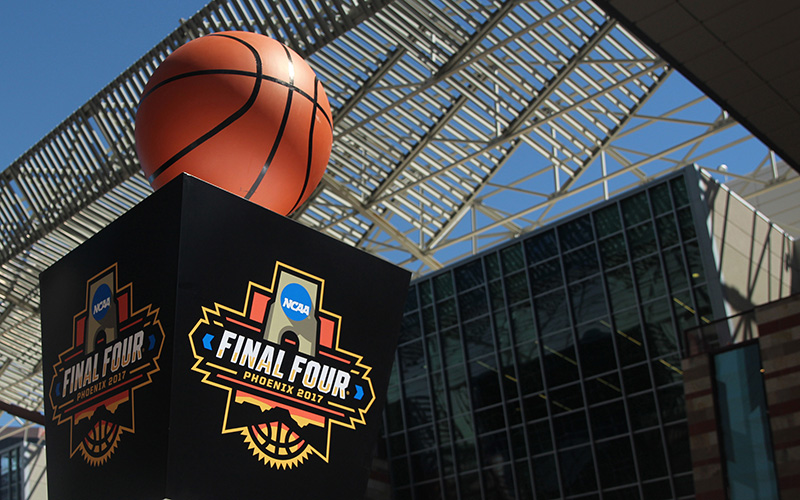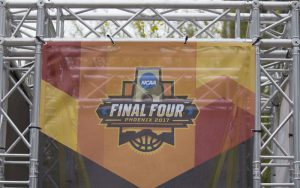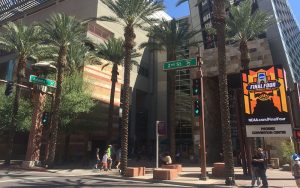
The Phoenix Convention Center held the NCAA Final Four Fan Fest. (Photo by Tyler Drake/ Cronkite News)
PHOENIX — The Valley can finally exhale.
It successfully hosted a Super Bowl, the College Football Playoff National Championship and the Final Four. Three mega events in three consecutive years.
“It’s a big deal for us,” said Brad Wright, chairman of the Arizona Organizing Committee.
The community may have to savor the experience for a while. With the professional sports landscape changing, and new facilities in the works in Las Vegas and Southern California, it could be a long time before the Valley hosts a similar trifecta.
Valley leaders recently reflected on the achievement and the path it took to accomplish the feat.

A Final Four directions map in downtown Phoenix shows all the events that came to the area. (Photo by Tyler Handlan/Cronkite News)
“These events shine a huge spotlight on the host community, Arizona and the Phoenix metropolitan area,” Wright said.
“We have a world-class stadium, we have a terrific airport that’s centrally located, we have the light rail, and we have hotels and resorts to accommodate the tens of thousands of visitors that come for these games. We have great restaurants, we have great golf courses, and we have all the amenities that make us an ideal location to host these events.”
Even if a location is ripe for a mega-event, it needs the backing of residents, said Andrew Bagnato, who, along with business partner Kristen Pflipsen, helped write the bids for college football’s title game as well as the Final Four.
“The community has to support it, has to want to do it,” he said. “I think in Phoenix, there’s a really large appetite for these events.”
Bagnato equated bids to contracts. Anything in the bid is expected to be executed fully if the city is awarded the right to host the event.
That requires organizations and communities to work together.
The biggest challenge, Bagnato said, is identifying partners and resolving the source of funding.
For the Valley’s three events, the partners included municipalities, the Cardinals, University of Phoenix Stadium, the Arizona Office of Tourism, and the Arizona Sports and Tourism Authority. All were heavily involved in securing Super Bowl XLIX in 2015, the College Football Playoff National Championship in 2016 and the Final Four in 2017.
Plenty of legwork was involved to land games of that magnitude in the desert.
“The Final Four bid we worked on exclusively from March of 2014 to November 2014,” Bagnato said. “The bid went out in late May, early June (and we) worked pretty much every day for two months. The bid went in and then there was some follow up, and then we have the site visit.”
“When we had the NCAA come out, essentially they got the bid in their hands and now they want to see what it looks in the real world. So you take them to all the places that you have kind of been bragging about in the bid,” he said.
The Phoenix area hosted two Super Bowls before 2015: in 1996 in Tempe and 2008 in Glendale. The community also hosted a collection of college football national championships before the 2016 game. Four came during the Bowl Championship Serie eras, and two occurred when polls helped determine the winner.
The Valley never had a Final Four before this year.

The Phoenix Convention Center was the location for 24 fan-friendly events during the weekend of the Final Four. (Photo by Tyler Handlan/Cronkite News).
That presented a challenge. Organizers needed to convince the NCAA that media would embrace the event because college sports’ governing body believes it is a competition worthy of large-scale coverage.
“We had to talk to media and say, ‘Hey this could happen,'” Bagnato said. “They did a great job of it.”
Glendale, home of University of Phoenix Stadium, also contributed to the success of the three events.
“Our motto is ‘Glendale has game,’ and we certainly have game,” Glendale Mayor Jerry Weiers said. “Glendale has proven over and over and over and over that we can handle them.”
Weiers believes visitors who came to the Valley for the Final Four enjoyed their stay, and he heard positive feedback about how businesses and citizens of Glendale treated out-of-towners.
The city’s residents take pride in hosting events of this magnitude, Weiers said.
One of his biggest priorities was making sure his community was safe.
“For our public safety, we have to ensure that we do these mega-events but still provide the same exact service to our citizens whether that mega-event is happening or not,” he said.
“And that’s the challenge. We’ve been able to partner with other cities in the state, with the state of Arizona itself, with the county, to make certain when one of our citizens dials 911, they’re going to get the exact same prompt service that they expect when there is a non-event.”
Other than some traffic accidents, which were expected, the Valley and its law enforcement agencies did not have serious public safety issues in this three-year run, community leaders said.
What is next for the Valley?
“There’s no bid cycle open right now,” Bagnato said. “I think Phoenix will be aggressive. We’ve been aggressive in the past and I’m sure that will be the case for whenever the next cycle comes up on all of these events.”
With a new facility being constructed for the Los Angeles Rams in Inglewood, Calif., and a stadium in the works in Las Vegas to house the soon-to-relocate Raiders, the Valley will have more competition for bids in the future.
The Final Four, however, will be out of the mix in Nevada.
The NCAA said in an email that it prohibits “the conducting of any championship session in a state with legal wagering that is based on single-game betting.”
The Super Bowl, the College Football Playoff National Championship and the Final Four were a success by all accounts. Wright, Bagnato and Weiers said they all enjoyed the experience and anticipate more will be here in the future.
Which should return first?
“That’s like asking who your favorite child is,” Bagnato said with a laugh. “I think they’re all great.
“To me, whoever wants to come back first, come on. We will make it work.”